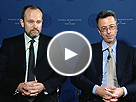The Federal Reserve Bank of New York today released Improving Survey Measures of Household Inflation Expectations, the latest article in its series Current Issues in Economics and Finance.
In late 2006, the Federal Reserve Bank of New York joined with other institutions and academic consultants to assess the feasibility of improving survey-based measures of consumers’ inflation and wage expectations. This initiative—known as the Household Inflation Expectations Project (HIEP)—has had two components: an evaluation of existing surveys of inflation expectations and the development and piloting of an alternative survey.
Reporting on the findings of the project in the Current Issues article, HIEP researchers Wändi Bruine de Bruin, Simon Potter, Robert Rich, Giorgio Topa, and Wilbert van der Klaauw note that their analysis reveals a number of limitations in existing surveys. The best-known of the surveys, the Reuters/University of Michigan Survey of Consumers, asks respondents to forecast changes in “prices in general” rather than changes in the “rate of inflation.” This wording, the authors suggest, invites diverse interpretations and prompts many respondents to focus on price changes specific to their own experience rather than changes in the overall price level.
A second limitation of existing surveys is their inability to capture respondents’ uncertainty about future inflation; respondents are asked to give only “point” (single-value) forecasts of inflation. Finally, the surveys fail to elicit information about wage expectations and the process by which respondents form and revise their inflation expectations.
In creating their own experimental survey, HIEP researchers sought to address these limitations. The HIEP survey asks respondents to report their expectations for the “rate of inflation” as well as “prices in general” and to forecast wage changes as well. The survey also asks respondents to assign probabilities to different possible inflation outcomes—a question format that allows respondents to convey the uncertainty attending their forecasts. Finally, by conducting repeat surveys with the same panel of respondents, HIEP researchers are able to gather information about how consumers revise their inflation expectations over time.
As the authors of the Current Issues study explain, the implementation of the alternative survey has shed light on trends in inflation expectations over the past three years. The survey, conducted at six-week intervals, has corroborated earlier findings of differences in inflation expectations across demographic groups and revealed marked changes in the size of these differences over the sample period. The survey results also show that the uncertainty of inflation expectations has abated since mid-2008, while the survey’s measure of wage expectations points to a continuing expectation that real wages will decline.
Commenting on the important roles played by inflation expectations, the authors note that these expectations enter into household saving and spending decisions and into negotiations about wage changes. The authors also suggest that understanding the public’s inflation expectations is important to policymakers who want to learn more about economic behavior and to evaluate the credibility of their communications with the public.
Wändi Bruine de Bruin is an assistant professor in the Department of Social and Decision Sciences and the Department of Engineering and Public Policy at Carnegie Mellon University; Simon Potter is director of economic research at the Federal Reserve Bank of New York; Robert Rich is an assistant vice president in the Bank’s Macroeconomic and Monetary Studies Function; Giorgio Topa is an assistant vice president and Wilbert van der Klaauw a vice president in the Microeconomic and Regional Studies Function.Improving Survey Measures of Household Inflation Expectations »
Contact
Media Relations
NY.Fed.Media.Relations@ny.frb.org











